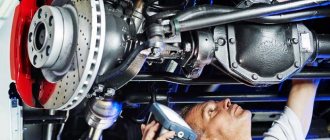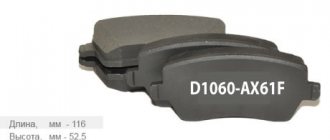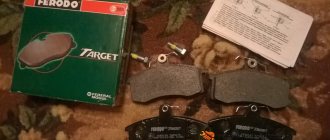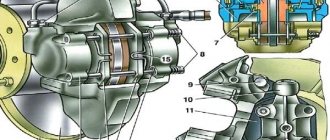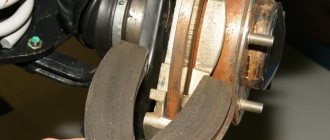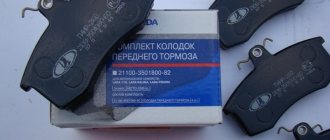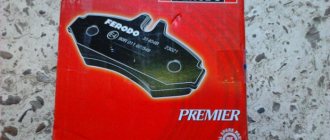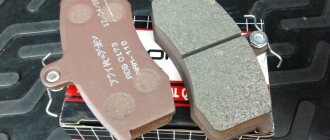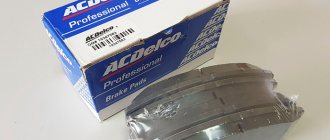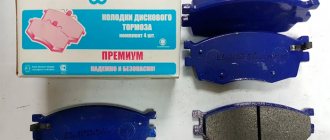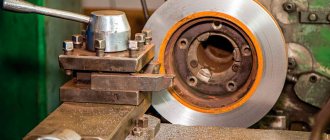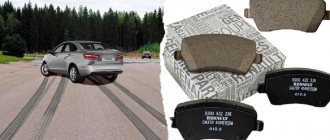Many car owners have noticed that when braking, a squeaking or whistling noise may appear. When figuring out why the brakes squeak and whistle, it turns out that it is the brake pads squeaking. When visiting a workshop, drivers will hear: “The low-quality pads need to be replaced.” But the parts were purchased at a large auto store, or supplied at a car dealership. How to explain this sound from the brake system?
Experienced drivers and car service technicians say that brakes whistle and squeak only partly due to the quality of the pads. We will find out all the reasons for such brake sounds and give advice on how to eliminate the problem.
Poor quality pads
If you hear a whistle when braking, and the pads have recently been replaced with new ones, then their quality is not up to standard. When rubbing with a disk, they crumble and become covered with dust. In this case, it can be argued that the material of the pads does not combine well with the material of the brake discs.
Pads are made from different friction materials. The layer involved in friction includes metal shavings: brass, copper and steel. These elements cause this nasty squeaking noise during braking.
It usually disappears if you replace the pads with quality products. It cannot be stated unequivocally that the sound in the form of a whistle is the cause of defective friction linings. They simply do not match the composition of discs or drums.
Generator belt
The alternator belt is one of the most common causes of unpleasant noise. In this case, a whistle appears when the car is moving, that is, under load. However, after accelerating or accelerating, it may go away. Also, if a whistle is heard when the car is moving and disappears when braking, then the reason for this phenomenon is simple - belt slippage and severe wear.
It is easy to solve this problem yourself. In this case, you don’t even need to go to a service station. You just need to buy a new alternator belt and replace it. However, if the car is under warranty, it is best to contact a car service center. Also, on some foreign cars, the mounting of the generator is quite complicated. Therefore, not everyone will be able to remove it.
If such a whistle occurs when the car is moving in rainy weather or after driving through a puddle, then the reason may be even more trivial - the belt getting wet. In this case, you just need to wait until the part dries. After this, the whistle will go away on its own. There is no need to worry about this.
Brake system defects
Another possible cause of squealing brakes can be vibration of the pads. These are microvibrations that arise from malfunctions of other elements.
Main malfunctions - causes of squealing brakes:
- a bead has formed along the outer diameter of the disk;
- the caliper jams when braking - the guide is not lubricated, the caliper piston moves poorly;
- Friction linings fall off, cover the caliper with dust, which jams;
- The caliper guide bushings have become rusty due to corrosion.
Other causes of squeaking
Sometimes small gravel gets between the disc and the casing while driving. It can also contribute to the squealing noise produced by the brake components.
Drum brakes also sometimes whistle and squeak. Many Russian cars and foreign cars have rear drum brakes. When a whistling sound appears in this type of brake design, the reasons are the same as in the disc design. But there are also differences due to the characteristics of the device.
If the disk system linings are too dusty, the dust is removed outward and does not remain on the surface of the linings. And in the case of a drum structure, dust settles inside on the parts and drum. Clean the elements from dust and the brake whine will stop.
If your car's brakes squeak and whistle, remember our tips and eliminate the causes. To do this, just remove the wheels, drums and look at the brake elements.
Interesting Facts
Some new brake pads have what is called a primer . It is located above the main friction material. After installing such a new pad, when driving for the first 50.100 kilometers, a squeaking noise may occur due to the rubbing of the pads and wear of the initial layer. That's why new pads squeak after replacement. This should be taken calmly and taken for granted. However, in order to save nerves, before purchasing certain brake pads, it is necessary to clarify information about whether they have the mentioned initial layer.
Sometimes pad squeaking also occurs on drum brakes. A striking example of this is the popular Renault Logan car. He has a so-called childhood disease, which is expressed in the fact that during heavy braking, the pads (especially new ones) can cling to the support shield. The elimination of this drawback, which means that the pads do not cling and creak, consists of rubbing the friction point with sandpaper.
Also, occasionally, metal chips stick to the disc and drum brake pads. It causes a quiet squeak and a decrease in braking efficiency. To get rid of this phenomenon, you need to dismantle the pads and remove such deposits using fine sandpaper. Please note that you need to work carefully so as not to damage the pad and its working surface.
How to eliminate squeaking brake pads.
Can't cope with the terrible whistle or squeaking of brake pads? Are you annoyed by the terrible sound when braking? You don't know what to do? Have you just recently changed your brake pads, but as a result there is a squeaking or whistling noise when braking? In fact, you can fix everything yourself.
Before moving directly to the description of a method that will help you get rid of squeaking brakes, we would like to note that not one auto mechanic will help you completely make the brake system silent. In any case, when you press the brake pedal hard, you will hear a squealing sound. However, in most cases, you can still get rid of squeaking or whistling.
Timing belt
Let's go further and consider the timing belt as a possible cause of whistling and rattling. Note that the belt itself cannot whistle, but the whistle can come from the rollers and tensioners. Determining that the sound comes specifically from the timing belt is quite difficult. At a minimum, you can start the engine and just listen to the place where the belt is. If the whistle is pronounced and comes from this particular node, then you need to go to the service station. After all, you won’t be able to do anything on your own. As already written above, the problem here is not in the belt itself, but in the system, and simply replacing the timing belt will not achieve anything.
What causes squealing brakes?
Modern brakes consist of metal brake discs that are sandwiched between two pads coated with a friction material. When the discs, caliper and brake pads are in perfect condition, the entire system works properly, and when you press the brakes hard, you will not hear an unpleasant squealing sound. Yes, when braking hard, you will hear a squeal from the brake system, but it will be more reminiscent of the sound of a properly tuned violin than of a non-professional bagpipe playing.
Just as for the normal sound of musical instruments, a tuner is needed, so for the normal tuning of the brake system, you need a professional auto mechanic who, in the event of a malfunction, will be able to adjust your braking system to optimal operation.
Flaws
Specialists still have work to do. Collision avoidance technologies do not perform satisfactorily in bad weather and at night. Road markings, their quantity and quality also affect the quality of work. If the camera does not distinguish dividing lines well enough, the system's performance will be reduced. As well as during thick fog, insufficient lighting, snowfall and other unfavorable conditions.
It's stupid to rely completely on electronics. In any case, the driver is responsible for the lives of people and the safety of property. These systems should be perceived as insurance and assistance, and not shift all the driver’s work onto them.
Normal brake noises
Many brake pads squeal or squeak during the first few braking sessions after the car has been parked overnight. As a rule, the squeak goes away after the brake pads heat up and do not drive away the moisture that has accumulated overnight.
Have you probably encountered grinding brake pads in rainy and damp weather in the morning? This is normal because a thin layer of rust has formed on the brake discs overnight due to moisture.
Previously, asbestos was used as a friction material on pads. Unfortunately, as a result of the study, doctors proved that asbestos can cause lung cancer and therefore decided to abandon the use of this material to cover brake pads.
Currently, alternative materials that are less hazardous to human health are used as friction materials. Thus, in recent years, the use of a combination of metal and ceramics as a coating has become increasingly popular. This is due to the fact that in recent years the automotive industry has been developing towards reducing the weight of all vehicle components. Therefore, reducing the weight of the braking system is an important task for all automobile companies.
But due to the use of new friction coatings, an unpleasant creaking (squealing) sound, etc. may appear when the car is braking. This is a small price to pay for increasing the power of modern cars by making all parts of the vehicle lighter.
Also, do not confuse the squeaking of brake pads when they have reached 80 percent wear. Let us remind you that most brake pads begin to squeak when the friction layer is almost worn out. This is done so that the owner of the car knows without diagnostics when it is time to change the pads to new ones.
Is it dangerous?
There is no clear answer to this question. The fact is that squeaking brakes are possible on both new and worn pads. To determine their residual life, you need to look at the thickness of the friction material. When to change brake pads? On modern elements, the manufacturer makes special “flags” - wear indicators between the two parts of the pads.
If this part is level with the entire plane of the block, this indicates an upcoming replacement. The brakes squeak when braking on a car with fairly worn elements. Sometimes it gets to the point that there is nothing left in the block except the metal body. As a result, they may simply jam and the car will skid. It is very dangerous. Change items on time. When to change brake pads? Usually they last 20-25 thousand kilometers. However, it all depends on your driving style. With active frequent braking, the service life of the pads is halved. Therefore, always look at their thickness visually. If the remaining friction material is 3-5 millimeters, the elements urgently need to be changed.
How to reduce squealing brake pads?
One of the most effective ways to get rid of squeaking or whistling when braking is to change the pads to others that use a different friction material. True, as a rule, it will be difficult to purchase non-original pads that will perform better than the original ones, but, nevertheless, it is possible.
Remember that the more expensive the pads, the more expensive their friction coating, which determines whether extraneous sound will appear when braking.
You can also reduce squeaking or whistling when braking by lubricating the pads with special compounds. We do not recommend that you use oil-based compounds and WD-40 to reduce friction between the brake disc and pads, as this may affect braking performance, which will reduce your safety.
In addition, before installing non-original pads, you can first use sandpaper to remove the metal burrs that are on the pads and then paint all the ends with fire-resistant paint. This way, you will achieve a reduction in excess gaps between the friction coating and the surface of the brake disc.
How to quickly and effectively get rid of annoying noise, is repair possible?
A whistle may be heard from the checkpoint. In this case, only service center technicians should carry out repairs. It’s right not to waste time, but to trust the professionals in your field. Usually you do not have to carry out repairs, but simply change the clutch. But for foreign cars, such a decision can promise large financial expenses. For example, whistling noise when driving a Chevrolet Cruze car could only be eliminated by replacing the entire clutch system. But this does not mean that only such a problem can arise in these cars.
Some car owners are not at all interested in extraneous car sounds. They drive cars that not only whistle, but also vibrate, brake poorly and pick up speed, especially not taking into account slight whistling, but the right decision is to check the car.
It is important to understand that you need to react quickly to a whistling wheel when turning. A responsible attitude will extend the life of your vehicle and protect you from accidents.
Source
Why and when we encounter grinding
Sticking of the friction lining to the disc for a split second and its subsequent breakdown generates vibrations. The human ear perceives them as a whistle, hence the complaint that the brakes squeak when braking on a car, the class of which, by the way, can be absolutely any.
If we compare the degree of harm from squeaking and the consequences of a tight clutch, then the second is more dangerous to health. But squealing is hard to come to terms with morally. Every now and then it gives me a headache.
In 80% of cases, the symptom occurs after changing the pads. It happens that even the “originals” whistle. Those who have not looked beyond the rim for a long time or have entrusted this matter to inexperienced service workers are also faced with this fact. In humid weather, grinding noise is also possible.
Simply incompatible
The pads are not always to blame for the appearance of extraneous sounds, because they work “in close contact” with the discs. The sound quality depends on the compatibility of the friction lining and disc materials. The same pads can completely suit one car owner and greatly irritate another with their squeaks. Ideally, the components of the friction pairs should be manufactured by the same manufacturer: this minimizes the risk of “incompatibility”. But there is still no guarantee that the brakes will work quietly.
Wear - critical
Those who are used to calling in for service only when the car breaks down have probably encountered this situation: the pad lining is completely worn out, braking occurs with a metal plate (base) on the disc. More often than not, this is caused by ignoring timely diagnostics and maintenance. But don’t rush to just install new pads - perhaps one of the pistons is jammed, as a result of which
and increased wear occurs. It is easy to determine the malfunction: other pads in such cases are in a much more efficient condition.
Of course, sounds when braking have nothing to do with its effectiveness. However, we can say that squeaking does indirectly affect safety: it provokes the driver to use the brakes less often and makes him nervous every time he presses the pedal. So, if getting rid of loud brakes does not require a lot of money and time, it is better to deal with them as quickly as possible.
Why even new pads squeak when braking smoothly?
The whole difficulty is that the reason can only be found by brute force. If a defect appears immediately after replacing the friction linings, you have to think only about the fact that they have not gotten used, about problems with their quality, or about the absence of anti-squeak plates on the back of the part. If no one serviced the brake system the day before, inspect all components:
- Pads. Some models are equipped with “squeaks” - special metal brackets attached to the side of the product. When the friction part wears critically, the metal comes into contact with the disc, and we get a squeaking sound.
- Brake discs. They wear out and often unevenly. Allowable end runout is no more than 0.020 mm.
- Caliper. Wedging of the working cylinders and the entire structure on the guides is not allowed. Torn anthers must be replaced, fingers must be lubricated with a special compound that is resistant to high temperatures.
There is no need to carry out an inspection if the disk has been exposed to water, sand or has become corroded.
You can do nothing, as in the case of the alternator belt whistling in the cold after driving through a puddle, or perform a series of long, smooth braking. This will help dry the part or remove dirt from it. For example, repeat the cycle three times: acceleration to 80 km/h and smooth deceleration to 20 km/h. If the pads squeak when braking after a recent wash, get ready to find a turner or go to the store. Cold water falling on a hot disk leads to improper hardening. As a result, it wears unevenly and runs out.
For your information. Ceramic parts tend to squeak when cold. They have a slightly higher setting temperature than conventional brakes, so the whistle goes away after a few brake applications.
Temporary difficulties
The grinding noise may occur after the car has been driven through mud. The sand that gets between the pads and the brake disc is quickly erased into dust and the squeaking stops. If the contamination is serious, it is better not to risk the “health” of the brake system and your own safety. Troubleshooting in a specialized center will not take much time.
A stuck pebble between the disc and the brake shield begins to creak unpleasantly. If this happens, the sound will be heard all the time while driving, regardless of whether the brake pedal is pressed or not. You can remove such an “alien” yourself. Caution—immediately after driving, the brake system components may be hot and you may get burned.
It is difficult to determine the exact cause of the squeak on your own, so if a malfunction occurs, we recommend contacting the official service centers of the FAVORIT MOTORS Group of Companies. Qualified technicians will quickly determine the cause of the “sound” and carry out high-quality repairs.
What to do to make new brakes stop squeaking when braking the car at low speed
Actually, if nothing was done before the grinding noise appeared, then this is a call to at least inspect the area around the calipers. Where to look has already been discussed; these cases do not require additional comments. An interesting list of actions in relation to fresh pads, which after installation began to squeak. Replacement immediately is not an option, this is a last resort method.
Lapping in
Give the friction linings time to grind in. After several hundred kilometers of city travel, their working surface will be in full contact with the disk, and this is a reason to stop the whistling, but not the only one.
Brake squeal caused by foreign object or dirt
If the brake pads are not worn out, but the whistle still appears, you need to remove them and check them for foreign objects and contamination. The pad lining has a transverse slot in the middle, which is designed to collect wear products (dust). When the slot becomes completely clogged, dust comes into contact with the blade and can cause a whistling noise. The whistling noise can cause the stone to get stuck between the working rubbing surfaces, as well as moisture ingress.
The solution to the problem is to disassemble and clean the pads from dirt and wear products. Or you can drive around for a while and watch the whistle. In some cases it goes away on its own.
Unusual cases of grinding noise on the front and rear wheels
The route map is designed for standard circumstances, when squeaking appeared on old pads during soft braking or immediately after replacement. What to do if everything was fine in the summer, but with the advent of cold weather a squeal appeared? Or what to do if a squeaking noise appears even when the brake pedal is released? Look for answers in a special selection:
- The brakes began to squeak in the cold. During a thaw, moisture may settle on the discs. If the process is regular, lubricate the back side of the pads.
- Whistle even when the brake is not pressed. Overhaul the brake calipers. Make sure that they move freely along the guides and that the working cylinders do not jam.
What's the result?
You cannot leave a whistling sound in the engine and hope that it will go away on its own. Most likely, if you leave everything as is, then a malfunction of any system could lead to more serious problems with the engine in the future. Eliminating the whistle at an early stage will avoid high costs for engine repairs. So be sure to listen to the engine. If you find any strange whistling, try to determine more precisely where it is coming from. And if you can’t do this, then go to a service station. Let the professionals deal with this.
However, some car owners are not bothered by various extraneous noises from engines at all. They successfully drive cars that not only emit an unpleasant whistle, but also jerk when moving, accelerate and brake poorly
What can we say about some kind of whistle, which few people will pay attention to! But the vehicle is still worth checking
Note: constructive measures aimed at preventing whistling
A microscope is not needed to examine engineering tricks. They are of a purely technical nature. We have already talked about one of them - anti-squeak linings on the back of the products. Find out about other means of combating vibration below:
- Bevels and slots on the friction layer move resonant vibrations to higher frequencies.
- The slots perform a role similar to bevels + remove dirt from the contact patch.
- Anti-vibration plates dampen vibrations relative to the piston and caliper bracket.
- Specially curved elements on the back of the pad fit tightly into the working cylinder, which helps to avoid noise in many braking modes.
- Wire brackets dampen vibrations of the friction part along the guide.
- Damping bushings are installed on one of the caliper guide fingers to absorb vibrations.
